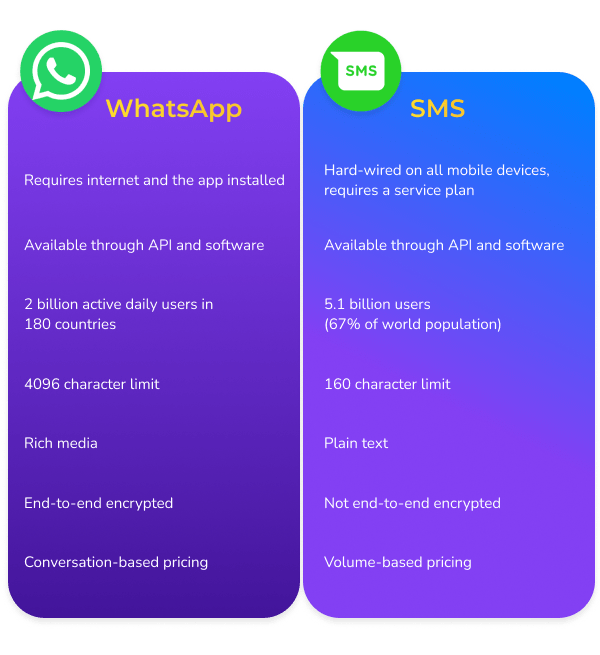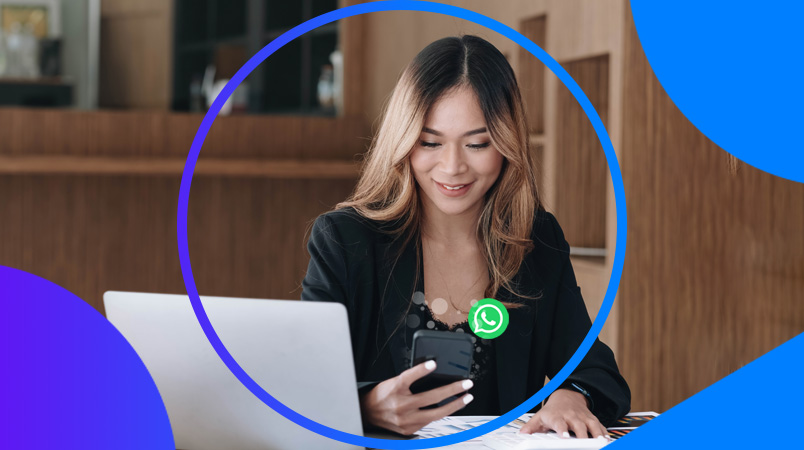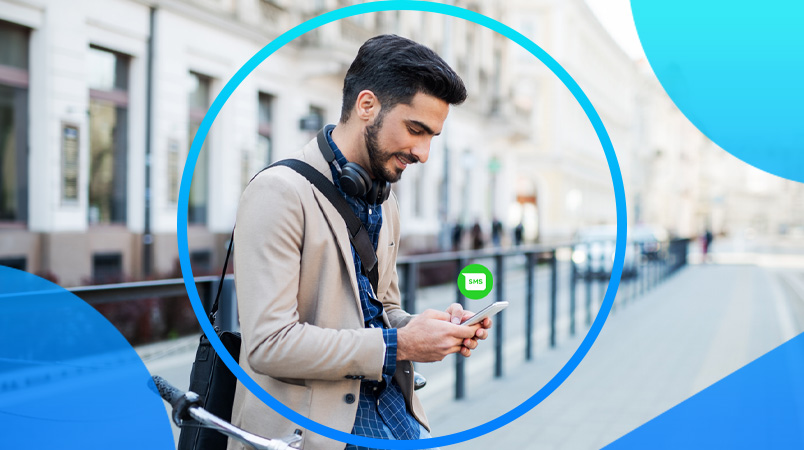At CM.com we offer both SMS and WhatsApp solutions for businesses, but that doesn't mean we want to push you into purchasing both. Far from it! The communication channels you choose for your business should fit both your needs, and the needs of your audience.
Both WhatsApp and SMS are widely used messaging channel giants, boasting incredible numbers worldwide. Though the launch of WhatsApp in 2009 managed to make impact on SMS traffic, the ol' reliable SMS is still going strong. In this blog, we'd like to highlight the differences between these WhatsApp and SMS from a business perspective, so you'll be able to make a well-advised decision for your communication strategy.
WhatsApp vs SMS: Overview and Stats
What is WhatsApp Business Platform?
WhatsApp is one of the most popular global messaging channels. WhatsApp offers its users cross-platform conversational style messaging services via smartphones, and it relies on internet access to deliver these messages. WhatsApp can be accessed on any device with internet acces, including desktops, laptops, tablets, and phones. WhatsApp messages have rich media, allowing users to share text, images, and video messages in two-way communication with a 4096 character limit per message.
The app is available in 60 different languages in over 180 countries worldwide, with a handful of exceptions. WhatsApp is most popular in Europe. In the Netherlands, its market penetration is a whopping 85%, followed closely by Spain and Italy with 83%. In fact, WhatsApp is in the top three most popular messaging channels in most countries. And also across generations, WhatsApp's popularity doesn't dwindle. Boomers (55+) and Gen X (45-54) both crown the messaging app as most popular, and it has a place in the top three of both Millennials (25-44) and Gen Z (18-24).
With more than 2 billion active daily users worldwide and within all generations, it’s no surprise that Meta also offers a solution for business to harness the power of this messaging platform: WhatsApp Business Platform. WhatsApp Business Platform is available through API or software, depending on your business needs. In fact, you even have the choice between an On-Premise API or a Cloud API. Both APIs can be easily accessed via a WhatsApp Business Solution Provider (BSP) like CM.com.
TL;DR WhatsApp Business Platform
Cross-platform messaging service
Internet access required
Global reach (180 countries), 2 billion active daily users
Available through API and Software
Rich media
4096 character limit
Two-way communication
Conversational UI
What is SMS for Business?
SMS, or Short Message Service, is one of the oldest text messaging services. Launched in the 1980's, SMS allows users to send and receive (short) text messages (two-way communication) on mobile phones. There are no specific requirements needed for SMS: A valid phone number and a service plan to send and receive messages is enough. Every mobile phone has a native SMS app built in, which means that receiving SMS messages is already hard-wired into all mobile devices worldwide. With 5.1 billion mobile service users around the world (67% of the global population), SMS becomes a powerful tool to reach your audience.
Since the rise of instant messaging apps, SMS has experienced an impact on its traffic. Contrary to the newer apps with their rich features, SMS is quite basic in its communication. Plain text messages, without fluff, and a character limit of 160.
SMS is available for business communication via API or cloud software, depending on your company needs.
TL;DR SMS
Hard-wired on all mobile devices (no additional requirements)
Service plan required
Global reach, 5.1 billion users (67% of world population)
Available through API and software
No rich media
160 character limit
Two-way communication
Now that we know the core strengths and features of both channels, we can compare them for (high-volume) business use. WhatsApp Business Platform vs SMS for Business.
WhatsApp vs SMS in a Nutshell

WhatsApp vs SMS: Engagement & Reach
Though both channels allow two-way communication and are technically conversational in nature, we can all admit that WhatsApp is the more conversational of the two. Sure, SMS also has the option of two-way messaging, but it is more often used as a one-way street. This is important to keep in mind when you wish to engage your customers.
WhatsApp tends to create a more personal and informal customer engagement than SMS, and boasts higher engagement rates. It's also faster than SMS, in the sense that customers are likely to react, interact, or answer faster. This in turn will help build customer relationships and trust, leading to a boost in customer satisfaction rates and brand loyalty. The caveat however, is that not everybody uses WhatsApp (or has reliable internet access), so there is a (small) chance that you won't reach your entire audience. SMS has the added benefit of being a native app on almost phones, making it a great tool to reach the vast majority of your audience, even the ones without reliable internet access. There may however be cross-border restrictions, depending on your target audience.
WhatsApp is great for having a conversation with your customers, but SMS is also very capable of doing just that. Likewise, SMS is known to be a big asset for outputting information in bulk, but WhatsApp is also capable of high volumes. Both channels can be your ally, and it really comes down to your personal goals and audience preferences.
Opt-Ins
It is important to note that before you can engage with customers on WhatsApp, you will need to adhere to the country regulations of your audience, and on top of that, get an opt-in from your customers. WhatsApp enforces this opt-in policy to protect the quality of its services. SMS messages may also need an opt-in, depending on country regulations, but they are generally 'easier' to send, as long as you have the phone number of your customer.
WhatsApp vs SMS: Security
Scammers are unfortunately a threat that we all need to keep in mind when communicating with customers. You don't want your loyal customers to fall victim to criminals who message them impersonating your business or abusing your services.
WhatsApp messages are end-to-end encrypted, meaning that the messages are encrypted before being sent. Only the recipient can read the messages, making it hard for scammers to access the contents. SMS messages are unfortunately not encrypted, which poses a risk of interception if you don't take additional security measures.
WhatsApp Business Platform users can also claim authenticity by verifying their business accounts. This will help your customers identify between your business and possible scammers.
WhatsApp vs SMS: Use Cases
Customer Support
WhatsApp's informal and conversational nature makes it a great tool for customer support. Have your customers engage with your business via WhatsApp Business Platform and let them ask their questions and problems within an interface they are already familiar with. You can even let a chatbot answer commonly asked questions to automate and streamline your customer support.
Notifications
Sending time-sensitive notifications such as tracking and order updates can be done via WhatsApp, but SMS will excel at keeping your customers up-to-date and notified. Whereas WhatsApp notifications are limited to device owners with a WhatsApp account (and internet accessibility), SMS notifications will get delivered to any mobile phone with a service plan. Ultimately, sending WhatsApp notifications will often have a need for a fallback messaging option (SMS) if the customer is not active on WhatsApp.
Marketing & Sales
Sending your customers the latest deals and offers via promotional messages can be easily done via WhatsApp. The platform is more personal, and the rich media and product messages feature can truly enhance the offers you send out to your audience. The conversational nature of WhatsApp lends itself perfectly for Conversational Commerce, and even assisted sales. It's a great channel for stimulating engagement with your customers, but there's a catch - your customers need to have WhatsApp installed.
SMS can similarly be used to send promotional messages, with an impressive open rate of 98%. Though SMS may lack the rich media that WhatsApp has incorporated in its platform, it has the benefits of its incredible reach. Also, SMS can make up for its lack of rich features with a link to a (fancy) landing page with for example marketing offers.
Authentication & OTPs
When it comes to security, there is one important use case both channels can assist with: Multi-Factor Authentication. Even devices without a stable internet connection are capable of receiving an SMS messages, making SMS a very reliable choice for sending one time passwords (OTP's).
WhatsApp messages, including WhatsApp OTPs, are encrypted from end to end, making it one of the safest options available. It's no surprise that WhatsApp Business is also a popular choice for sending OTPs. There is, however, a caveat; You need to have that opt-in from your customers that we mentioned earlier.
WhatsApp vs SMS: Pricing
Let's talk numbers! First off, the way both platforms price their services is vastly different: SMS pricing is often related to volume (per SMS or bundled prices), while WhatsApp pricing is conversation-based, with different rates for different conversation types. These pricing systems relate to the way these platforms focus on customer engagement: conversations via WhatsApp Business Platform vs bulk output via SMS.
Generally speaking, SMS is a tad more expensive, because you need to acquire a business number from an SMS provider (like CM.com). Sure, some number types are free, but as a business, you will probably prefer a short code number. They just look way more professional and trustworthy. After purchasing a number, SMS providers will charge a fee per SMS or per bundle of messages, and will often offer volume discounts.
WhatsApp Business Platform charges per conversation, and applies different rates based on conversation type and on who initiated the conversation. Customer-initiated and Utility conversations (support and OTPs) are generally cheaper than messages that your business initiates (like marketing messages). Good news though, each WhatsApp Business Account receives 1,000 free service or customer-initiated conversations per month.
WhatsApp vs SMS: Which One Suits Your Business?
Whether WhatsApp Business Platform or SMS for Business suits your business best, highly depends on your goals, your audience, and the data you have available. WhatsApp Business Platform is a more conversational-based channel with higher engagement rates, ideal for conversing with your customers and building customer relationships and trust. It does however require that your customers have WhatsApp installed.
SMS is often seen as one-way communication, even though it also allows customers to converse with you. The true strength of SMS lies in its reach. The fact that it's native on most mobile phones makes it a powerful tool to reach your audience, regardless of internet connection or downloaded apps.
And this doesn't even need to be a choice. WhatsApp Business Platform and SMS for Business compliment each other greatly. Engage customers over WhatsApp and fall back to SMS for the audiences that don't use WhatsApp.
Check out CM.com's WhatsApp Business Platform and SMS solutions below, and feel free to reach out to one of our experts to discuss the possibilities for your business.








